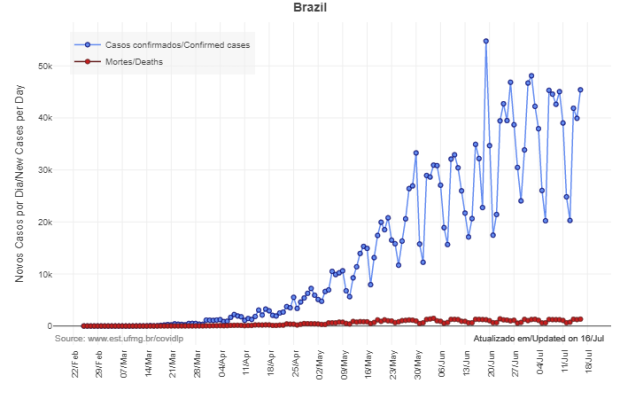The Covid19 pandemic is a major concern throughout the world and Brazil is at the top of the sad list of countries most affected. At the same time, serious concerns have surfaced from various sectors of the Brazilian society regarding the disclosure of official data on the state of the pandemic.
This controversy was made more explicit in a series of press conferences by top officials from the Ministry of Health (MH) in early June 2020. The events that followed and that will be described in this post highlight the importance of retaining the integrity of official data at all cost.
The regular press conference held on Friday (5 June) made clear the intention of the MH to introduce profound changes in the treatment of pandemic data: the time for the release and announcement of the daily data would be postponed by a few hours. No clear reason was provided, but Brazil’s President Jair Bolsonaro celebrated the fact that this change would prevent the country’s main evening news programs from reporting data from that day. The unusual attention given to the time at which public data would be released and associating it to dissemination by the media triggered an alert signal in everyone involved with the pandemic.
In addition to changing the release time, MH informed they would change the nature of the data that would be released. To understand what was said, it is worth first noting that: (1) the internationally adopted standard by the vast majority of countries around the world is to disclose the numbers of confirmed cases and deaths that were reported that day, and (2) adding these numbers to the numbers previously accumulated leads to the reported totals.

While not perfect, this strategy is a clear and simple way for all information to be made available and verified. It is widely known that counting data by its reporting date (as opposed to its ocurrence date) is not ideal, as it shifts the actual occurrences dates to later dates when they become available to the official apparatus of the country / state / municipality. Take the following example:
When a country reports 100 confirmed cases on a given day, it is to be expected that only a portion of them were actually confirmed on that day. As an illustration, assume that 60 of the 100 cases were confirmed that day, 15 were confirmed the day before, 10 were confirmed 2 days before, 5 were confirmed 3 days before, and 10 were confirmed more than 3 days before. Several different reasons can lead to these delays, from the absence of the professional responsible for registering the case to failure in communication between hospitals and government institutions.
Reconstruction of daily occurrences is possible using the case histories. However, this task is far from trivial, especially in a large country where it takes hours to accomplish the much simpler task of receiving data compiled from a level (e.g., municipal/county) and aggregating it at the hierarchically superior level (e.g., state).
Asking that the whole history of counts be reviewed every day is a mission full of pitfalls, and should be avoided. Also, the possibility of mishandling the feed back and forward of this information is not small. Thus, while recognizing the scientific advantage of counting the number of cases by date they occurred, the practical difficulties have led to a preference by most countries in the world for disclosing counts of cases by notification date instead of occurrence date.
In a press conference of the MH on Monday (8 June), authorities of the MH said that the offical disclosure would be replaced by disclosing only the cases that occurred daily, without disclosing the total accumulated cases. This statement brought enormous concern about the unavailability (and consequent loss) of the total case and death counts. To reconstruct them, one would have to go back to the previous counts, which were also not made available, although there was a mention that this would be done. On that day, there was also an interruption in the disclosure of the historical series of cases and deaths, making it impossible to recover the daily totals and values of the previous days. On that day, Brazil lost the ability to know its total cases and deaths based on the Federal Government portal, that was created specifically for this purpose.
This decision by the MH had a very negative impact on the country and the media recorded numerous expressions of concern and rejection. These manifestations were not restricted to the country and were also relayed by the international media. With the absence of reliable information, several initiatives were launched. Public institutions moved in order to fill the information gap announced. The creation of portals with updated data were announced by the National Council of State Health Secretaries, and the intention to do the same was announced by the National Congress and by the one of the Federal Courts! Additionally, several initiatives by groups of individuals that had already been following the evolution of the pandemic were announced to remedy the possible data supression.
A group of leading national newspapers also decided to promote their own case and death calculations. The counts presented by this media consortium were markedly higher than those released by the MH, as expected. However, despite their goodwill, the consortium numbers included some of the biases that the same newspapers had previously complained about in the official accounting. Namely, there was no wide disclosure of the full content of their calculations in any accessible portal, data were not made available, and the data that were released at the discretion of the newspapers involved only a portion of the information that the MH already presented. We tried to contact some journalists involved in this platform to understand their reasons but were unsuccessful.
On the following day, the country’s highest court, the Supreme Federal Court (STF), ruled that the MH would again disclose the totals of reported confirmed cases and deaths. It is somewhat odd to have the judicial system demanding that the government continue to fulfill its role of informing the nation of the data it collects. This move may have been instrumental. That same day, the MH portal for Covid19 reaffirmed the previous definition of confirmed cases as being those notified, contrary to what they said at the previous day’s press conference.
In fact, at the end of the day, the counts presented by the MH were substantially higher, even when compared those released by the press consortium. This led to the suggestion that the change announced the previous day had been ruled out, but there was no official communiqué from the MH about that. That same day, the interim Minister of Health assured the National Congress that the full data would continue to be released. The platform released the following day showed yet another change in format, but still followed the standard of disclosing data by notification date instead occurrence date.
A few weeks after that tragic day for pandemic data disclosure in Brazil, the situation seems to have normalized. The MH continues to disclose as before, with only an odd disruption here and there. The initiatives of independent groups remain active; some of them were already following the pandemic well before this incident. The counts of the newspaper consortium are still being released as I write this, but I doubt they will last much longer. Fortunately, it seems it was just a scare, but it served to make the whole nation more aware and thereby discouraged changes incompatible with the standard adopted in the rest of the world.
Making it difficult to obtain the correct data will not prevent a country from eventually getting it, albeit at a higher cost. And, changing the pattern of data release will not prevent the country from adequately informing itself about the evolution of the pandemic. Hopefully the lesson has been learnt.
-----
This post is revised version of a post originally published in Portuguese at my blog StatPop.





